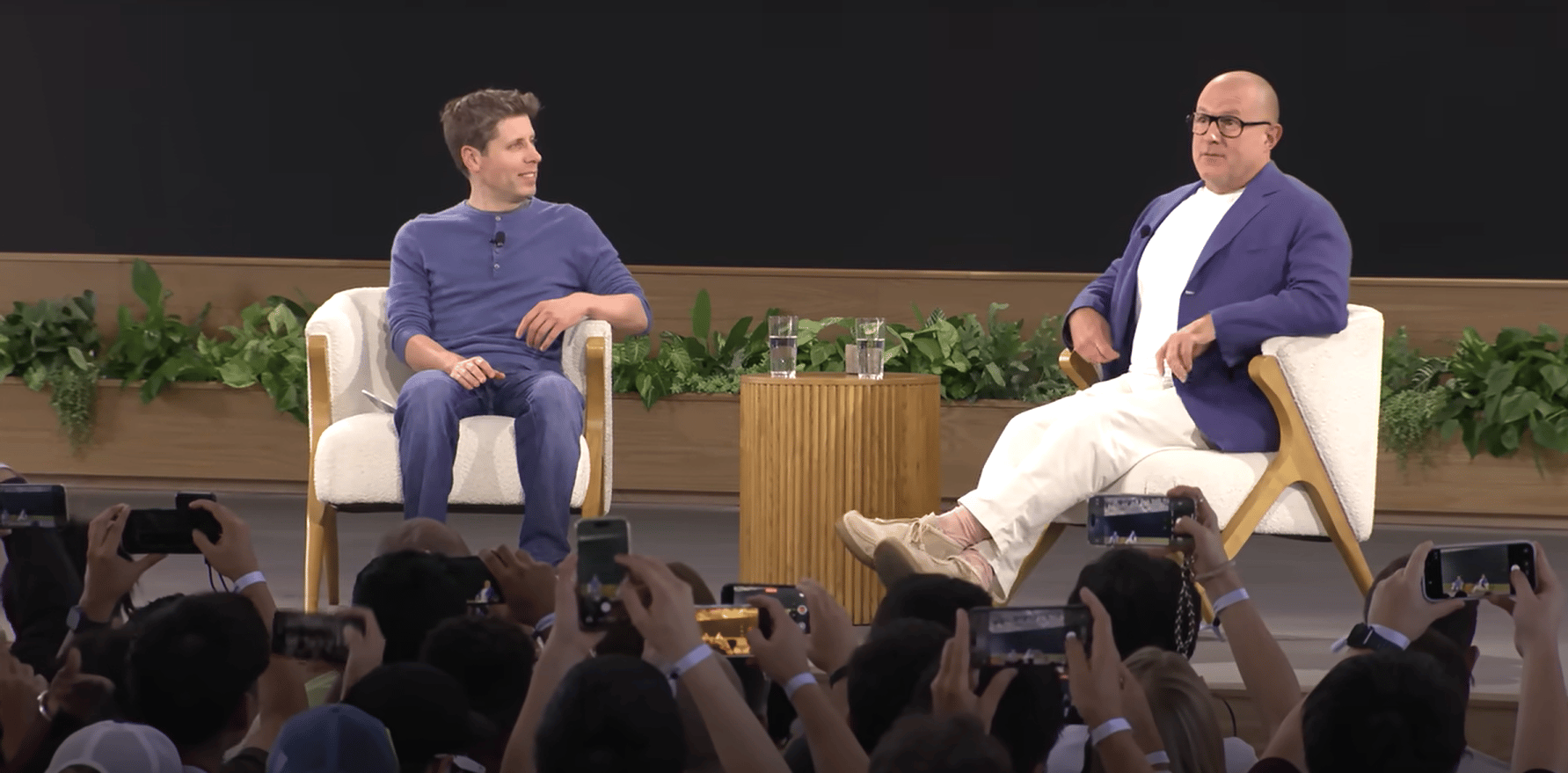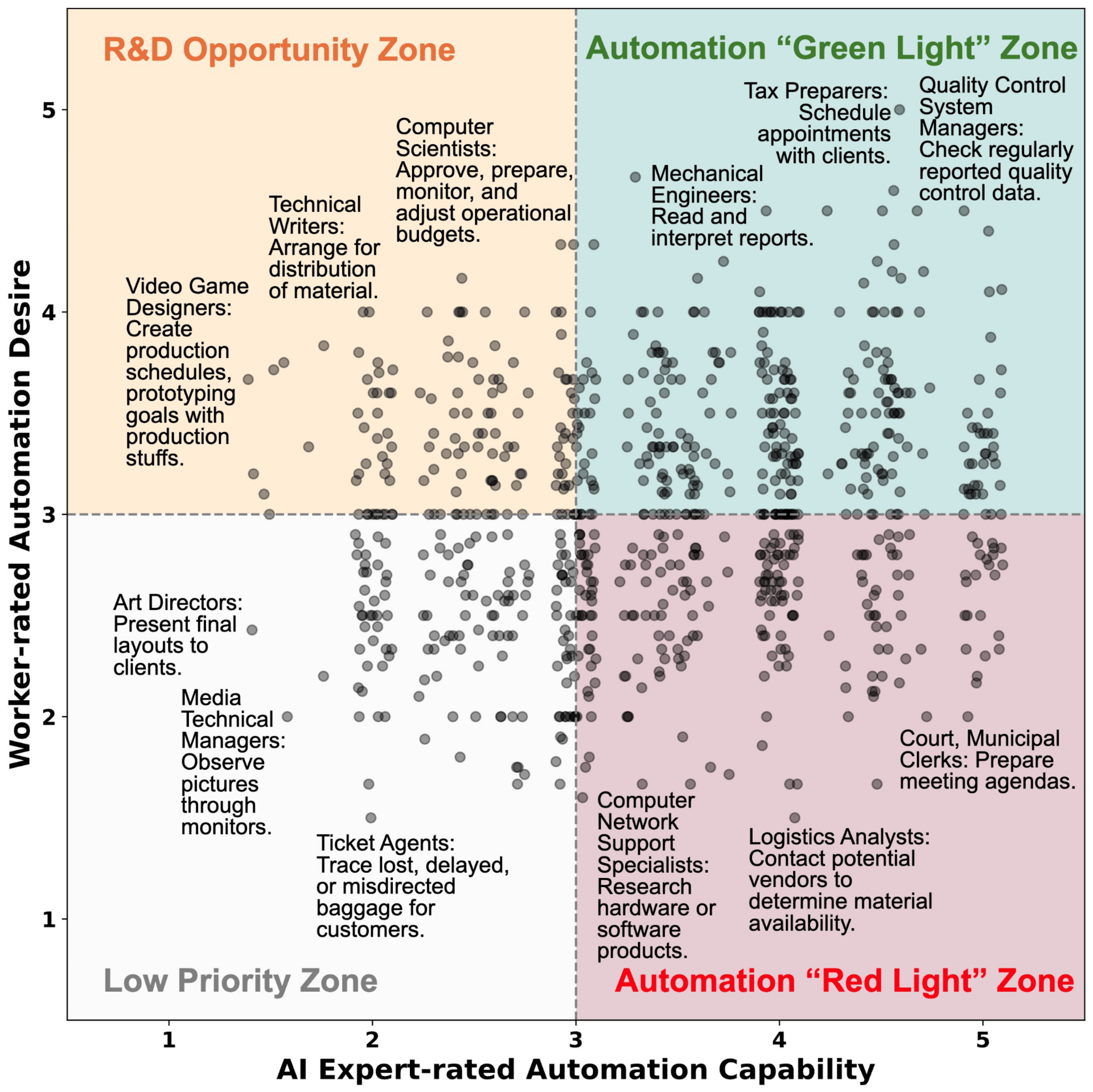- The Shift
- Posts
- AI’s most human experiment yet
AI’s most human experiment yet
Plus, What Americans think AI should automate, Zendesk’s AI agent promises to solve 80% of support tickets, and more!

Hello Readers👀
Curious about the biggest AI moves today? You’re in the right place. In today’s edition, we have:
🤝 Sam Altman x Jony Ive: Rethinking the Future of Devices
🧭 What Americans Think AI Should Automate, and What Must Stay Human
🧠 Zendesk’s AI Agent Promises to Solve 80% of Support Tickets
🔨Tools and Shifts you cannot miss
🤝 Sam Altman x Jony Ive: Rethinking the Future of Devices
Sam Altman and Jony Ive sat down to discuss their collaboration on AI-driven hardware following OpenAI’s $6.5B acquisition of Ive’s design firm, LoveFrom. The conversation revealed their shared belief that today’s relationship with technology is “uncomfortable” and that a new family of devices could redefine how humans connect with AI.

The Shift:
1. The purpose behind the partnership - Ive said his six-year creative journey only found meaning when ChatGPT launched, describing AI as the medium through which his team’s design philosophy finally made sense.
2. A new chapter for hardware design - Ive’s team has already developed 15–20 product concepts exploring what “post-phone” computing could look like. He argued it’s “absurd” to believe AI’s full potential can be delivered through legacy devices like smartphones, while Altman emphasized that any new product must justify its existence with an extraordinary use case.
3. Redefining our relationship with technology - Ive said humans currently have an “uncomfortable relationship” with their devices, tools that often leave us anxious and disconnected. He sees AI as a chance to “make us happy, fulfilled, peaceful,” and to design experiences that feel more caring, intuitive, and less transactional.
Ive and Altman see AI as an opportunity to make devices that restore calm, connection, and purpose to how we interact with machines. Both acknowledged the dizzying pace of AI innovation, and Ive admitted that the hardest part isn’t having ideas, it’s maintaining focus amid overwhelming momentum.
🧭 What Americans Think AI Should Automate, and What Must Stay Human
A new study by Simon Friis and James Riley (Harvard Business School), shared by Ethan Mollick, asked 2,357 Americans which jobs AI should take over. The findings reveal a clear pattern: people are pragmatic about automation when it boosts performance, but deeply principled when it threatens human meaning.

The Shift:
1) Support for automation is broader than expected - Americans already support automating around 30% of occupations, even at today’s capability levels. When told to imagine AI that outperforms humans at lower cost, that support nearly doubles to 58%. The message is clear: people resist failure, not the idea of machines working.
2) But there’s a moral hard stop - Roughly 12% of occupations, including clergy, therapists, judges, and childcare workers, are viewed as morally repugnant to automate. These roles rely on empathy, trust, and moral reasoning that people refuse to delegate, no matter how good AI becomes.
3) The “moral friction” map of work - Jobs like economists, search marketing strategists, and analysts rank as both technically automatable and socially acceptable. By contrast, caregiving and psychological roles land in the “dual friction” zone, AI could perform them, but society resists.
Americans appear comfortable letting AI take over mechanical or analytical work but draw the line at emotional and ethical labor. Both Friis & Riley’s moral-permission framework and Stanford’s worker study (Brynjolfsson et al.) converge on one insight: the future of work won’t be humans versus AI, it’ll be humans deciding where humanity still matters most.
🧠 Zendesk’s AI Agent Promises to Solve 80% of Support Tickets
Zendesk just announced an autonomous AI support agent that it says can handle 80% of customer issues without human help. The launch, unveiled at the company’s AI Summit, also includes a co-pilot agent to assist human reps, plus new voice, admin, and analytics agents. President of Product and AI, Shashi Upadhyay, called it a shift from “software built for humans” to “software that does the work itself.”

The Shift:
1) From assistance to autonomy - Zendesk’s new system aims to go beyond basic chatbots or retrieval tools. It’s powered by LLMs trained for complex troubleshooting and self-directed action, not just scripted responses. Independent TAU-bench tests show the top-performing AI model already handles 85% of return-processing tasks, validating Zendesk’s claim.
2) Built on a string of AI acquisitions - The platform combines technologies from recent purchases, Hyperarc (analytics), Klaus (QA automation), and Ultimate (workflow automation). These integrations allow Zendesk’s agents to triage, resolve, and analyze support cases across channels while continuously learning from interactions.
3) Real-world results and rising stakes - Early pilots show a 5–10 point jump in customer satisfaction. Zendesk’s system currently supports 20,000 businesses and 4.6 billion tickets annually, meaning even partial automation could transform global service economics.
Zendesk’s move signals a structural inflection point for AI in enterprise support, from co-pilot tools to full autonomy. If the system truly resolves 80% of cases, it could redefine the balance between human empathy and machine efficiency in customer experience, while setting a new baseline for what “AI-first” operations look like in service industries.
🤳AI Nugget of the Day
🚨 The world’s first AI scientist just refused to build a bioweapon.
Most models will help you design one if you phrase it politely.
This one said no.It’s called SafeScientist an autonomous research system that runs experiments, writes papers, and stops itself when things get
— Jainam Parmar (@aiwithjainam)
11:06 AM • Oct 9, 2025
🔨AI Tools for the Shift
💬 Renée Space – She’s there for the messy bits — work stress, weird texts from your ex, existential dread, late-night money panic. You don’t need to pretend it’s fine.
🖋 CaptionThat.app – Upload your image or video and let AI handle the writing so you can focus on creating.
📖 WebNovel AI – Build web fiction from concept to manuscript with structured story planning powered by Novel AI technology.
⚙️ Geneo – Track your visibility across ChatGPT, Perplexity, and Google AI Overview while optimizing with GEO and AEO strategies.
🚀 JustCopy.ai – Skip the prompting. Instantly clone and deploy production-ready AI apps with one click.
🚀Quick Shifts
🖼️ Microsoft is launching a new OneDrive app for Windows with a photo gallery, people view, AI-powered slideshows, and editing tools, plus a Photos Agent for Copilot users that acts like a chatbot for finding and organizing images.
💸 OpenAI expands trillion-dollar AI infrastructure spree as Sam Altman confirms more mega-deals coming, following Nvidia and AMD partnerships aimed at building self-hosted hyperscalers and fueling future AI model demand.
🎬 OpenAI’s invite-only video app Sora hit 627,000 iOS downloads in its first week — surpassing ChatGPT’s launch pace and topping the U.S. App Store despite limited access and rising deepfake controversy.
👟 Google expands its AI-powered virtual try-on tool to Australia, Canada, and Japan, now letting shoppers try on shoes digitally by uploading full-body photos, enhancing personalized, immersive online shopping experiences.
That’s all for today’s edition. See you tomorrow as we track down and get you all that matters in the daily AI Shift!
If you loved this edition, let us know how much:
How good and useful was today's edition |
Forward it to your pal to give them a daily dose of the shift so they can 👇
Reply